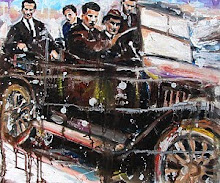(wikipedia.org)
But you will know that the only poetry that should be allowed in a state is hymns to the gods and paeans in praise of good men; once you go beyond that and admit the sweet lyric or epic muse, pleasure and pain become your rulers instead of law and the rational principles commonly accepted as best. [...] Our defence, then, when we are reminded that we banished poetry from our state, must be that its character was such as to give us good grounds for so doing and that our argument required it.
Plato The Republic
Plato The Republic
With Plato Nature is turned upside down: the things of nature are themselves no more than copies of the Ideas rather than the other way around i.e. that Ideas are actually copies of things.
Thus the artist through imagination (1) works from the real and makes it into an idea and (2) challenges the right of the Father to form and shape the world. He only 'imitates' what God and the craftsman have 'made' and is therefore a liar.
Thus the artist through imagination (1) works from the real and makes it into an idea and (2) challenges the right of the Father to form and shape the world. He only 'imitates' what God and the craftsman have 'made' and is therefore a liar.
God is as good as possible and remains in his own form without variation forever ... So we cannot have any poet saying that the gods disguise themselves in every kind of shape ... We must stop all stories of this kind and stop mothers being misled by them and scaring children by perversion of the myths ...
Plato The Republic
Thus the artists must be banned from the Republic as they would refuse to conform to the dominant ideology of absolute being and pursue what was possibly a counter-culture or remnants of polytheism and survivals of an earlier knowledge and ideas. This is Plato's all-out war against difference by denial and censorship, yet, at the same time, carried out in the name of rational knowledge and truth.
















No comments:
Post a Comment